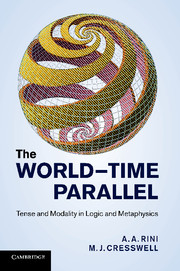Book contents
- Frontmatter
- Contents
- Preface
- Introduction
- PART I TRUTH AND INDEXICALITY
- PART II PREDICATE LOGIC: TENSE AND MODAL
- PART III TIMES AND WORLDS, OR TENSE AND MODALITY?
- PART IV DE RERUM NATURA
- Appendices
- 1 The equivalence of ℒmulti, ℒxtw and ℒi
- 2 Language and metalanguage
- 3 Plantinga's metaphysics
- 4 Interval semantics
- 5 Fatalism and the world–time parallel (with H. Kocurek)
- Bibliography
- Index
2 - Language and metalanguage
from Appendices
Published online by Cambridge University Press: 05 March 2012
- Frontmatter
- Contents
- Preface
- Introduction
- PART I TRUTH AND INDEXICALITY
- PART II PREDICATE LOGIC: TENSE AND MODAL
- PART III TIMES AND WORLDS, OR TENSE AND MODALITY?
- PART IV DE RERUM NATURA
- Appendices
- 1 The equivalence of ℒmulti, ℒxtw and ℒi
- 2 Language and metalanguage
- 3 Plantinga's metaphysics
- 4 Interval semantics
- 5 Fatalism and the world–time parallel (with H. Kocurek)
- Bibliography
- Index
Summary
The results of Appendix 1 establish that straightforward sentences of natural language require a framework which is equivalent in power to that provided by explicit quantification over times and worlds. Given that power, the possibility emerges of showing that the tense and modal language has itself the power to express the truth conditions of a modal predicate language. It might be tempting to express this by saying that such a language has the power to express its own semantics. That, however, would not be correct, because it is known that such languages lead to paradox, and our book is not about the semantic paradoxes. All we will say is that if you have a tense and modal object language with the resources described in Chapters 6 and 8 you can express its indexical semantics in a similar metalanguage which includes but extends the object language with a mechanism for referring to the sentences of the object language and saying things about them.
The indexical semantics assumed so far uses the panoply of set theory. But in fact much less will do the trick, and a three-sorted indexical language in the style of ℒi is sufficient to provide the framework for the indexical semantics for the tense and modal languages of Chapter 8. Given the results of Appendix 1 it will follow therefore that one cannot argue that the semantics of tense and modality demand an untensed non-modal metalanguage – and even if one could, the mechanisms for tense and modality are exactly analogous.
Information
- Type
- Chapter
- Information
- The World-Time ParallelTense and Modality in Logic and Metaphysics, pp. 215 - 224Publisher: Cambridge University PressPrint publication year: 2012
